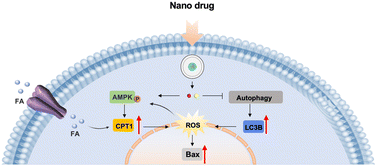Nanodrug regulates ROS homeostasis via enhancing fatty acid oxidation and inhibiting autophagy to overcome tumor drug resistance†
Abstract
The treatment of drug-resistant tumors poses a significant challenge in the field of tumor therapy. Disrupting the homeostasis of reactive oxygen species (ROS) within tumor cells may represent a pivotal strategy for overcoming the prevalent issue of drug resistance. However, the restricted sustainability of ROS generation and the increased autophagy capacity exhibited by tumor cells hinder the application of ROS-based therapies. In this study, we developed liposome nanoparticles (Ato/CQ@L) for co-encapsulation of atorvastatin (Ato), an activator of AMP-activated protein kinase (AMPK), and chloroquine (CQ), an autophagy inhibitor. Upon internalization by tumor cells, Ato upregulated carnitine palmitoyltransferase 1(CPT1) concentration and promoted fatty acid oxidation (FAO) within the tumor cells. The process of FAO coupled with an abundance of fatty acid substrates, facilitates a sustained generation of ROS production. Concurrently, a positive feedback loop is established between escalated concentration of ROS and AMPK protein levels, resulting in a persistent elevation in ROS levels. In addition, CQ disrupted lysosomes, leading to an increased lysosomal pH and reducing autophagy in tumor cells. In both in vivo and in vitro experiments, the Ato/CQ@L treatment group exhibited a considerable enhancement in tumor cell apoptosis, validating the efficacy of this combined therapy. In summary, the combined therapy involving Ato and CQ addresses the inherent limitations of conventional ROS therapy, which include insufficient ROS production and increased autophagy. This approach holds significant potential as a treatment strategy for drug-resistant triple-negative breast cancer.



 Please wait while we load your content...
Please wait while we load your content...